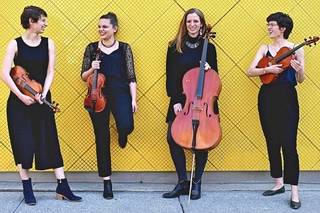|
Back
Bleak Futures, Hopeful Music New York
DiMenna Center for Classical Music
03/30/2024 -
Fima Chupakhin: One Day They Will Be Dancing
Valentyn Silvestrov: Silent Songs: V. “Farewell, world”
Steve Reich: Different Trains: II. “Europe”
Marian Fil: Devaldi Korbes
Stefania Turkevych: Songs
Mykhailo Chedryk: Sonare (world premiere)
Ksenia Stetsenko: Flüchtlingesdodekaphonie No. 24
Kaija Saariaho: Changing Light
Jennifer Gliere (Soprano), Hans Tashjian (Bass-Baritone), Ginevra Petrucci (Flute), Hsuan‑Fong Chen (Oboe), Gleb Kanasevich, Paul Cho (Clarinets), Mike Lormand (Trombone), Valeriya Sholokhova (Cello), Tristan Kasten-Krause (Double Bass), Sean Statser (Percussion),Fima Chupakhin, Anna Keiserman, Yuliya Basis, Alexander Chaplinskiy (Piano), The Rhythm Method (String Quartet)
James Baker (Conductor)

K. Saariaho/S. Reich
“Music is still song, even if one cannot literally sing it: it is not a philosophy, not a world-view. It is, above all, a chant, a song the world sings about itself, it is the musical testimony to life.”
Valentyn Silvestrov
“The land of the Chang tribes is not my home, Why have I stayed here so long?//In the lonely night, I cannot sleep,/Gathering my robe, I rise to pluck the zither./Silk strings on wood answer my mood./A stranded traveler has no hope to break away./And melancholy thoughts are strong and hard in my heart.”
Wang Ts’an (177-217)
With the subtitle “Travel Diaries” for the fourth and final concert of the Ukrainian Contemporary music Festival, one hardly expected Expedia or Trip Advisor. The tragedy of Ukraine is that “travel” has meant escape. Jewish refugees from the 19th Century, others from Hitler, and other taking refuge–not merely travel–from injustice, bigotry and wars of all stripes.
Thus, the six Ukrainian composers, with one Finn and one American, gave us variations ranging from the shadowy to the black, poetry of sad remembrance to music which emanated with desolation, fear, and the horror of homelessness.
The assuaging element was that the dozen-odd musicians, many Ukrainians themselves, were of brilliant quality. The music, while hardly jovial, was given such artistry that the eight works formed a tapestry, a diversity of moods.
One, Ksenia Stetsenko’s Refugee Dodecaphony No. 24 for two clarinets, could have been subtitled Un sospiro. It was hardly a breath, 24 measures of a tone row which gave instant satisfaction–and was finished in a moment. (In comparison, Webern’s Bagatelles were like Wagnerian operas.)
Give songs by the astonishing Stefania Turkevych, Ukraine’s first female composer, were longer, suffering only by the omission of English lyrics on the back wall. Yes, the poetry was printed in the program, yet one hardly memorized the words–of hopelessness, memory, images of a distant home. (She had taken refuge from the Soviets first in Austria, then London.)
Her own poetry, as I read later, was stunningly beautiful, as were the melodies sung by soprano Jennifer Gliere. (Yes, a relative of that other Ukrainian-born composer, Reinhold Glière.) How can one describe them? The Russian–or possibly Ukrainian–element was present throughout. One felt that, had Mussorgsky studied with Alban Berg, the same lyricism, the same chimeric mourning, would have been present.
Ms. Gliere was also soloist in the most familiar composer, the late Kaija Saariaho. Each time we hear this woman’s eclectic styles, one feels that she never ever compromised what was deepest inside her. This was a duet between the soprano and violinist Leah Asher from a Jewish poem. Each soloist found a style on its own. Ms. Asher sliding up and down on the violin, while Ms. Gliere soared into a soprano stratosphere.
The result was mesmeric. Yet nowhere near the never-changing whispering bass-baritone voice of Hans Tashjian in Valentyn Silvestrov’s “Farewell, world” from his Silent Songs. A refugee from the Ukraine, Silvestrov is an acquired taste, about which I am an unashamed addict. This was an exercise, not in tranquility, but in the stasis of feeling. The words speak of “rages”, hiding in the clouds, sometimes reflected in Anna Keiserman’s piano. The voice, though, was one nearly of resignation. But more resignation, as in Samuel Beckett’s poetry, taking death as a certainty to be dreamed about in life itself. This was a wonderful work, and oh! how I would like to hear a concert with the full two hours of Silent Songs.
Otherworldly!
A greater ensemble was for the world premiere of Mykhailo Chedryk’s Sonare for double-bass and ensemble. This was all too short. Starting with heavy breathing (by both piano and instruments) and a lovely cadenza by Tristan Kasten-Krause.

The Rhythm Method (© Maya Bernardo)
Steve Reich’s second movement of Different Trains was not other-worldly. It was too much of this world. The world of Dachau and Auschwitz and Sztutowo. As played by the wonderful quartet of player/composers The Rhythm Method, we heard the screeching, whining stop-and-start, squeaking, shattering yelling trains carrying victims to their Nazi infernos.
Would one have know the fear and trembling of the trains without knowing Reich’s description? An impossible answer. For in this extraordinary concert, Different Trains was one of the studies in bleak futures. At times, resolving, at times surrendering, at times, as in Silvestrov’s song, the terror of mortal understanding.
Harry Rolnick
|